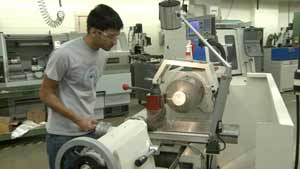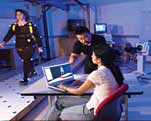College of EngineeringIndustrial and Systems EngineeringUniversity Exemplary Department
OverviewThe Grado Department of Industrial and Systems Engineering advances the discipline and imparts knowledge to students, peers and practitioners. In an environment that fosters leadership, achievement, and diversity, we:
The applications for industrial engineering capabilities include industry, government, and service organizations. Graduates of the ISE program at Virginia Tech work in manufacturing facilities, distribution warehouses, hospitals, airlines, railroads, banks, amusement parks, the military, federal government, and management consulting firms. The boundaries of where IEs make contributions are limitless. The mission of the ISE Undergraduate Program is to prepare industrial and systems engineering students to create value for organizations, the profession, and society. We achieve this mission by recruiting, retaining, and educating high quality and diverse students and by creating a rigorous and collegial environment enabling students to learn industrial engineering methods and tools, built upon a foundation of mathematical, physical, and engineering sciences, and to apply them in any global organizational setting. Students are able to achieve academic and professional success through opportunities to participate in various educational experiences, to develop capabilities as future leaders, and to embark on a lifelong journey of professional development and learning. Program Educational Objectives and Student OutcomesThe ISE faculty, with input from our external Advisory Board, employers, and students, have defined the following Program Educational Objectives (PEOs) and Student Outcomes for our Undergraduate Program. PEOs are statements that describe the expected accomplishments of ISE graduates within 3-5 years after graduation. Student Outcomes are statements that describe what students are expected to know and be able to do at the time of graduation. Program Educational Objectives: Within 3-5 years of graduation, ISE alumni will have:
Student Outcomes: At the time of graduation, ISE students will have the:
The Industrial and Systems Engineering program at Virginia Tech is accredited is accredited by the Engineering Accreditation Commission of ABET, http://www.abet.org. CurriculumThe ISE curriculum explicitly encompasses coursework useful in addressing not only the technical elements of work systems, but also the organizational, economic, and human elements. Our aim is to provide graduates with the knowledge and capabilities to enable them to successfully pursue careers in industrial engineering or, if qualified, to continue on to graduate study. ISE emphasizes instruction in fundamental engineering principles based on the physical sciences, engineering sciences, mathematics, and statistics. These principles are applied in practical design experiences throughout the undergraduate curriculum. Course work in the physical and chemical sciences and mathematics provides a solid background for basic engineering science courses, which in turn support more focused courses in industrial engineering, covering topics in operations research, manufacturing systems engineering, human factors engineering and ergonomics, and management systems engineering. In all these areas, analysis and design activities are supported by modern computing and software tools taught in the curriculum. Students gain valuable hands-on experience in multiple areas of our curriculum in state-of-the-art laboratory facilities associated with the undergraduate program. These include the ISE Computer Laboratory, which contains computers and printers to support the needs and requirements of ISE students that are not available through access to personal computers or in other laboratories; the Senior Design Center, with computer support and other resource material for student design projects; the Harris Manufacturing Processes Laboratories, which contain robotics and automation equipment, machining equipment, conventional and numerically controlled machine tools, and welding and foundry facilities; the Human Factors Work Measurement and Methods Engineering Laboratory, which is equipped and used for in-class exercises and experiments in work measurement, motion economy and time study, psychophysics, human audition and vision, and work station design. Students also have the opportunity to work on Undergraduate Research with faculty and graduate students in the many ISE research labs and groups. The capstone course in the ISE Undergraduate Program is a two-semester class, ISE 4005-6 Project Management & System Design (also referred to as “Senior Design”), where students work in project teams with an external company sponsor to solve a real-world problem. This experience provides ISE students with actual project experience that develops technical and professional skills, such as teamwork, communication, project management, and life-long learning skills, in addition to developing capabilities in applying IE tools and techniques. Student project teams present their project findings at our annual Senior Design Symposium attended by company sponsors and the ISE Advisory Board. For the 2016 graduation requirements, the course work totals 133 hours. Electives provide students with the opportunity to explore other areas of engineering, as well as cultural, societal and creative experiences, which makes for a well-rounded, diverse, and globally-aware engineer. The ISE program also provides students with the opportunity to pursue minors, such as a Business Minor, Green Engineering Minor, or Math Minor. More specific information about minors available to ISE students can be found in the ISE Undergraduate Student Handbook, posted on the ISE web site. Students and employers alike are seeing the benefits of these minors for adding value to the ISE major. The department participates in the Cooperative Education Program, in which qualified students may alternate semesters of study with semesters of professional co-op employment or internships. Students are encouraged to pursue these experiences before they graduate to make them more competitive in the work force. Students are also encouraged to participate in career fairs and job interviews on and off campus. The ISE department also maintains bilateral student exchange agreements with international universities, where students can take ISE courses which will transfer back to their BSISE. Students may also select other universities at which to perform a study abroad semester. Graduate programs leading to the M.S. and Ph.D. are offered (see Graduate Catalog). The graduate programs include concentrations in manufacturing systems engineering, human factors engineering and ergonomics, operations research, management systems engineering, and general IE. The ISE Department also coordinates on- and off-campus master's degree programs in systems engineering (M.S.) and engineering administration (M.E.A.). Program Requirements
The graduation requirements in effect at the time of graduation apply. When choosing the degree requirements information, always choose the year of your expected date of graduation. Requirements for graduation are referred to via university publications as “Checksheets”. The number of credit hours required for degree completion varies among curricula. Students must satisfactorily complete all requirements and university obligations for degree completion. The university reserves the right to modify requirements in a degree program. However, the university will not alter degree requirements less than two years from the expected graduation year unless there is a transition plan for students already in the degree program. Please visit the University Registrar website at http://www.registrar.vt.edu/graduation/checksheets/index.html for degree requirements. Students are strongly encouraged to meet with one of our Academic Advisors to discuss and understand the curriculum. Undergraduate Course Descriptions (ISE)2004: INTRODUCTION TO INDUSTRIAL AND SYSTEMS ENGINEERING 2014: ENGINEERING ECONOMY 2034: DATA MANAGEMENT FOR INDUSTRIAL AND SYSTEMS ENGINEERS 2204: MANUFACTURING PROCESSES 2214: MANUFACTURING PROCESSES LABORATORY 2404: DETERMINISTIC OPERATIONS RESEARCH I 2984: SPECIAL STUDY 2994: UNDERGRADUATE RESEARCH 3004: INDUSTRIAL COST CONTROL 3214: FACILITIES PLANNING AND LOGISTICS 3414: PROBABILISTIC OPERATIONS RESEARCH 3424: DISCRETE-EVENT COMPUTER SIMULATION 3434: DETERMINISTIC OPERATIONS RESEARCH II 3614: HUMAN FACTORS ENGINEERING AND ERGONOMICS 3624: INDUSTRIAL ERGONOMICS 4004: THEORY OF ORGANIZATION 4005-4006: PROJECT MANAGEMENT AND SYSTEMS DESIGN 4015,4016: MANAGEMENT SYSTEMS THEORY, APPLICATIONS, AND DESIGN 4204: PRODUCTION PLANNING AND INVENTORY CONTROL 4214: LEAN MANUFACTURING 4264: INDUSTRIAL AUTOMATION 4304: GLOBAL ISSUES IN INDUSTRIAL MANAGEMENT 4404: STATISTICAL QUALITY CONTROL 4414: INDUSTRIAL QUALITY CONTROL 4424: LOGISTICS ENGINEERING 4624: WORK PHYSIOLOGY 4644: OCCUPATIONAL SAFETY AND HAZARD CONTROL 4654: PRINCIPLES OF INDUSTRIAL HYGIENE 4974: INDEPENDENT STUDY 4984: SPECIAL STUDY 4994: UNDERGRADUATE RESEARCH
College of Engineering Programs of Study
Engineering Education | Aerospace and Ocean Engineering | Biological Systems Engineering | Chemical Engineering Civil and Environmental Engineering | Computer Science | Electrical and Computer Engineering Engineering Science and Mechanics | General Engineering | Industrial and Systems Engineering Materials Science and Engineering | Mechanical Engineering | Mining Engineering |


